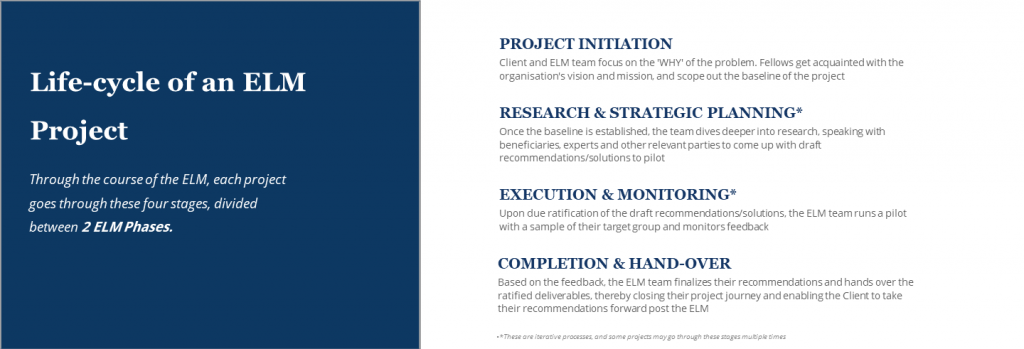ELM Stakeholders
Partner Organisations
The organisation that shares a project objective for an ELM team to work on, while engaging, guiding, and supervising the team’s work. Two representatives from the organisation regularly guide and touch base with the ELM team as well as the YIF Internal Team. These may include for-profit/not-for-profit organisations, government institutions, established businesses, start-ups, policy-makers, think tanks, educational/research institutions, etc.
Partner organisations share a project objective for an ELM team to work on while engaging, guiding and supervising the team’s work. Two representatives from the organisation referred to as Project Head (PH) and Project Lead (PL) regularly guide and touch base with the ELM team as well as the YIF Internal Team.
Over the last ten years of the YIF, our projects have spanned diverse domains and sectors, including government and policy, entrepreneurship, social development, education, art and heritage, media and communications, research etc. Some of our past partner organisations include the Government of Delhi, QCI, National Institute of Urban Affairs, the UNFPA, Pratham, the University of Arizona, People’s Archive of Rural India (PARI), Renew Power, Nymble Labs, STIR Education, Carnegie India, Tata Steel Adventure Foundation, Centre for Policy Research, Generation India Foundation, eGovernments Foundation, PadCare Foundation, STENUM Asia, among others.
YIF Internal Team
From the University’s end, the Fellows’ learning and progress in the ELM are overseen by an ELM supervising faculty member, and members of the YIF Programme team, who together form the ‘YIF Internal Team’. Mr. Srikant Sastri will be the ELM supervising faculty for the YIF class of 2024.
The Fellows receive training on problem-solving, team-building, basics of research and data analytical skills from the ELM supervising faculty and relevant domain experts. Each team is given focused attention and their progress is enabled through periodic reviews, reports, and requisite meetings.
ELM Team
The Fellows’ team works directly with the Partner organisation on the project with a structured approach to deliver sustainable impact. They work every Friday and Saturday during their ELM tenure. The teams are formed based on their individual skills, interests, and project preferences, and pitch for the projects that they wish to work on.









